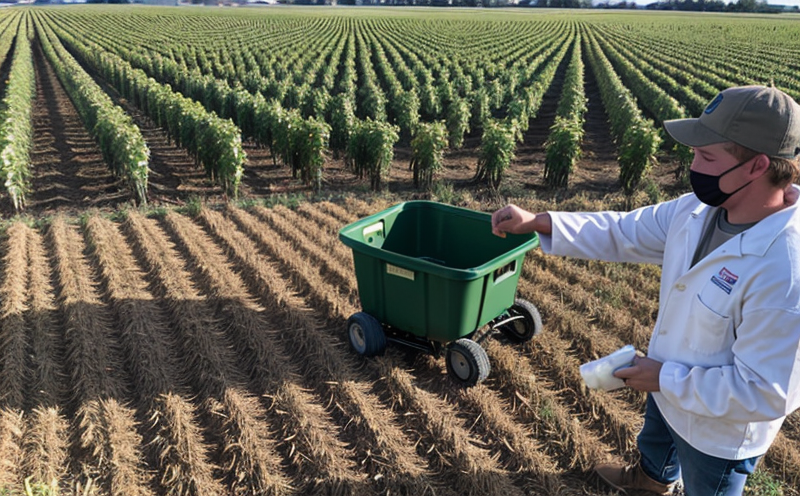Starch Content Testing in Grains and Tubers
The starch content of grains and tubers is a crucial metric that influences numerous aspects of agriculture and food processing. Starch, the primary carbohydrate stored by plants, plays a vital role in determining the nutritional value, digestibility, and overall quality of these products. In grains like corn, wheat, barley, and sorghum, as well as tubers such as potatoes, cassava, and yams, accurate starch content testing is essential for ensuring product consistency and compliance with international standards.
Starch content determination typically involves the quantification of amylopectin and amylose in the form of dry matter. This process is critical for optimizing food production, enhancing product quality, and meeting regulatory requirements. For instance, in the case of corn, starch content directly impacts its suitability as a feed ingredient or fuel source. In wheat, it affects the baking properties and loaf volume.
Industry standards such as ISO 13095:2018 and AOAC International provide detailed protocols for starch determination. These methods often involve gravimetric analysis after enzymatic hydrolysis to break down complex carbohydrates into simple sugars. The accuracy of these tests is paramount, especially in sectors like food manufacturing where consistency ensures consumer satisfaction.
Our laboratory employs advanced instrumentation such as near-infrared spectroscopy (NIRS) and differential scanning calorimetry (DSC) for precise starch content analysis. These techniques not only enhance the reliability of our results but also streamline the testing process, allowing for faster feedback to clients. Our expertise in handling diverse samples ensures that we can accommodate various grain and tuber types, from common crops like rice and oats to specialty products.
Understanding the starch content is essential for optimizing processing conditions, predicting product performance, and ensuring compliance with international standards. For example, in the production of flour, knowing the exact starch content helps in adjusting kneading times and dough consistency. In the case of biofuel production from cassava, accurate starch content testing ensures efficient fermentation processes.
Our service also extends to helping clients develop new products by providing detailed insights into how varying starch contents affect product characteristics. This capability is particularly valuable for R&D teams looking to innovate within their respective sectors.
Why It Matters
The importance of accurate starch content testing in grains and tubers cannot be overstated, as it impacts multiple facets of the agricultural and food processing industries. From enhancing product quality to ensuring compliance with international standards, this service plays a pivotal role.
- Enhanced Product Quality: Accurate starch content ensures that products meet consumer expectations regarding taste, texture, and nutritional value.
- Regulatory Compliance: Meeting international standards like ISO 13095:2018 is crucial for both domestic and export markets.
- Innovation in Processing: Understanding starch content aids in optimizing processing methods, leading to more efficient production processes.
- Sustainability Initiatives: By accurately measuring starch content, companies can develop more sustainable practices, such as minimizing waste during processing.
The reliability of our testing ensures that clients can make informed decisions about their products, thereby improving market competitiveness and customer satisfaction. Our service is designed to support the continuous improvement of agricultural and food processing operations, ensuring they remain at the forefront of innovation and sustainability.
Industry Applications
| Application Area | Description |
|---|---|
| Food Manufacturing | Ensuring consistent product quality, optimizing processing conditions. |
| Biofuel Production | Optimizing fermentation processes for efficient biofuel production. |
| Nutraceuticals | Developing products tailored to specific nutritional needs based on starch content. |
| Animal Feed Industry | Ensuring feed ingredients meet the required specifications, enhancing animal health and performance. |
- Agriculture: Monitoring crop health and yield potential by assessing starch content before harvest.
- Food Science: Investigating the effects of varying starch contents on product texture and taste.
These applications underscore the critical role that accurate starch content testing plays in various sectors, from ensuring food safety to driving innovation in biofuel production. Our laboratory is equipped with state-of-the-art facilities to meet these diverse needs, providing reliable and actionable insights for our clients.
Eurolab Advantages
At Eurolab, we pride ourselves on delivering unparalleled service in starch content testing. Our advantages are rooted in a combination of advanced technology, experienced personnel, and unwavering commitment to quality.
- State-of-the-Art Technology: Utilizing NIRS and DSC for precise and reliable results.
- Expert Personnel: A team of highly skilled professionals with extensive experience in agricultural testing.
- Comprehensive Reporting: Providing detailed reports that include actionable insights and recommendations.
- Quick Turnaround Times: Ensuring timely delivery of results to meet your operational needs.
- Custom Solutions: Tailoring our services to meet the specific requirements of each client, whether it's for R&D or quality control.
We understand that every client has unique needs. That’s why we offer customized solutions, ensuring that our service aligns with your goals and objectives. Our commitment to excellence extends beyond just testing; we are here to support you in making informed decisions about your products and processes.





